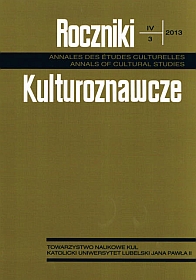The Qur’an and the Religious Traditions of the “People of the Book”
Abstract
A comparative study of the Qur'an proves a similarity in its contents with the earlier religious texts of the “People of the Book”, that means the Jews and the Christians. An analysis of these parallelisms shows also some differences between them and does not allow to consider the Qur'an as a simple compilation of earlier Scriptures. Muslims recognize that one Word of God is revealed in them by stages in different periods of humanity. God's truth contained in them has been corrupted, so that a new and perfect revelation was necessary, that of the Qur'an, to purify the previous Scriptures from falsehood. The belief in one God is the truth uniting all the revelations. No partners should be set up with Him, but everyone must bow to His Will. The purpose of the Qur'an is to show the hidden meaning of the ancient Scriptures, so that they become an instructive example for “men endued with understanding”. It is the belief in one God, the warning of punishment for the disbelievers and the announcement of the good news to the followers of the right path indicated by God in His final revelation.
References
ʿAbdullah Yūsuf ʿAlī: The Meaning of the Holy Qur'an. New Edition with Revised Translation, Commentary and Newly Compiled Comprehensive Index. Beltsville, Maryland: Amana Publications 2008.
Abdus Sattar Ghauri. The Actual Site of Moriah Or Al-Marwah. http://www.al-mawrid.org/pages/articles_english_detail.php?rid=625&cid=59 [dostęp: 15.03.2013].
Abdus Sattar Ghawri, Ihsanur Rahman Ghauri. The Only Son Offered for Sacrifice, Isaac Or Ishmael. http://books.google.pl/books?id=F1_lexmczwoC&pg=PA115&lpg=PA115&dq=moriah+and+marwah&source=bl&ots=yfgvKVvxgu&sig=iAkL5RO2Ra5ui4ig7imzuuIVSUM&hl=en&sa=X&ei=cgGxT8WcLOHP4QSB1dnaCQ&ved=0CFsQ6AEwAw#v=onepage&q=moriah%20and%20marwah&f=false [dostęp: 15.03.2013].
Apokryfy Nowego Testamentu. Ewangelie apokryficzne. Cz. 1 i 2. Red. M. Starowieyski. Wydawnictwo WAM: Kraków 2006.
Babylonian Talmud: Tractate ‘Abodah Zarah. http://halakhah.com/zarah/zarah_2.html [dostęp: 15.03.2013].
Babylonian Talmud: Tractate Sanhedrin. http://www.come-and-hear.com/sanhedrin/sanhedrin_110.html [dostęp: 16.03.2013].
Bar-Asher M.: Abel et Caïn. W: Dictionnaire du Coran. Sous la direction de Mohammad Ali Amir-Moezzi. Paris: Robert Lafont 2007 s. 7-8.
Bar-Asher M.: Isrâ'îliyyât. W: Dictionnaire du Coran. Sous la direction de Mohammad Ali Amir-Moezzi. Paris: Robert Lafont 2007 s. 430-432.
Buhl Fr.: Taḥrīf. W: First Encyclopedia of Islam 1913-1936. Leiden – New York – Köln: E. J. Brill 1993 vol. VII s. 618-619.
Charteris J.: Parallelism Between the Qur'an and Judeo-Christian Scriptures. http://wikiislam.net/wiki/Parallelism_Between_the_Qur%27an_and_Judeo-Christian_Scriptures [dostęp: 10.03.2013].
De Smet D.: Gens du livre. W: Dictionnaire du Coran. Sous la direction de Mohammad Ali Amir-Moezzi. Paris: Robert Lafont 2007 s. 367-369.
Ginzberg L.: The Legends of the Jews. Adam. Philadelphia: The Jewish Publication Society of America 1913.
Gobillot G.: Pacte prééternel. W: Dictionnaire du Coran. Sous la direction de Mohammad Ali Amir-Moezzi. Paris: Robert Lafont 2007 s. 627-631.
Gobillot G.: Sabéens. W: Dictionnaire du Coran. Sous la direction de Mohammad Ali Amir-Moezzi. Paris: Robert Lafont 2007 s. 777-778.
Goldziher I.: Ahl al-kitāb. W: First Encyclopedia of Islam 1913-1936. Leiden – New York – Köln: E. J. Brill 1993 vol. I s. 184-185.
Guiraud M.: Adam. W: Dictionnaire du Coran. Sous la direction de Mohammad Ali Amir-Moezzi. Paris: Robert Lafont 2007 s. 22-26.
Hadith Collection. http://www.hadithcollection.com/ [dostęp: 10.03.2013].
Koran. Przeł. J. Bielawski. Warszawa: PIW 1986.
Kościelniak K.: Złe duchy w Biblii i Koranie: wpływ demonologii biblijnej na koraniczne koncepcje szatana w kontekście oddziaływań religii starożytnych. Kraków: Wydawnictwo UNUM 1999.
Lory P.: Abraham. W: Dictionnaire du Coran. Sous la direction de Mohammad Ali Amir-Moezzi. Paris: Robert Lafont 2007 s. 9-14.
M S M Saifullah, Muhammad Ghoniem, Abu Hudhayfah & Khalid al-Khazraji: On The Transmitters Of Isra'iliyyat (Judeo-Christian Material). http://www.islamic-awareness.org/Hadith/Ulum/israel.html [dostęp: 12.03.2012].
Maszkowski R.: Obraz Jezusa w Koranie i wczesnej tradycji muzułmańskiej na podstawie literatury niemieckojęzycznej. Lublin: Polihymnia 2009.
Mattson I. The Story of the Qur'an. Its History and Place in Muslim Life. Oxford: Blackwell Publishing 2008.
Mishnah Sanhedrin. http://en.wikisource.org/wiki/Mishnah/Seder_Nezikin/Tractate_Sanhedrin/Chapter_4/5 [dostęp: 14.03.2013].
Muhammad Mustafa al-Azami. The History of the Qur'anic text: From Revelation to Compilation: A Comparative Study with the Old and New Testaments. Leicester: UK Islamic Academy 2003.
Nosowski J.: Teologia Koranu. Wykład systematyczny. Warszawa: ATK 1970.
Pismo Święte Starego i Nowego Testamentu. Biblia Tysiąclecia. Poznań: Wydawnictwo Pallottinum 2002.
Pismo Święte Starego i Nowego Testamentu. Red. M. Peter (Stary Testament), M. Wolniewicz (Nowy Testament). Poznań: Księgarnia Św. Wojciecha 2003.
Powszechna encyklopedia filozofii. Tom 7. Red. A. Maryniarczyk. Lublin: Polskie Towarzystwo Świętego Tomasza z Akwinu 2006.
Rippin A.: Western scholarship and the Qurʾān. W: J. D. McAuliffe. The Cambridge companion to the Qurʾān. Cambridge: University Press 2006 s. 235-251.
Rubinkiewicz R.: Apokryfy Starego Testamentu. Warszawa: Vocatio 1999.
Sam Shamoun: The Crucifixion of Christ. A Christian Critique of the Quran. http://www.answering-islam.org/Shamoun/crucifixion.htm [dostęp: 17.03.2013].
Sayyid Abul Ala Maududi: Tafhim al-Qur'an - The Meaning of the Qur'an. http://www.searchtruth.com/tafsir/tafsir.php [dostęp: 10.03.2013].
Skowron-Nalborczyk A., Grodź S.: Jednakowe słowo dla nas i dla was. List 138 uczonych i zwierzchników muzułmańskich do przywódców chrześcijaństwa. „Więź” 591:2008 z. 1 s. 31-54.
Sunna.com. http://sunnah.com [dostęp: 10.03.2013].
Szram M.: Nestoriusz. W: Powszechna encyklopedia filozofii. Tom 7. Red. A. Maryniarczyk. Lublin: Polskie Towarzystwo Świętego Tomasza z Akwinu 2006 s. 580-582.
Tafsīr ibn Kaṯīr. http://www.qtafsir.com [dostęp: 15.03.2013].
The Book of Adam. http://www.pseudepigrapha.com/pseudepigrapha/TheBookOfAdam.htm nr 14 [dostęp: 13.03.2013].
The Tafsirs. http://www.altafsir.com [dostęp: 10.03.2013].
Thorne Th.: The Legend of Abraham’s Father. http://www.feelingoutstanding.com/Legend_Abraham.html [dostęp: 14.03.2013].
Urvoy M.-T.: Inimitabilit'e du Coran. W: Dictionnaire du Coran. Sous la direction de Mohammad Ali Amir-Moezzi. Paris: Robert Lafont 2007 s. 419-420.
Zilio-Grandi I.: Satan. W: Dictionnaire du Coran. Sous la direction de Mohammad Ali Amir-Moezzi. Paris: Robert Lafont 2007 s. 790-793.





